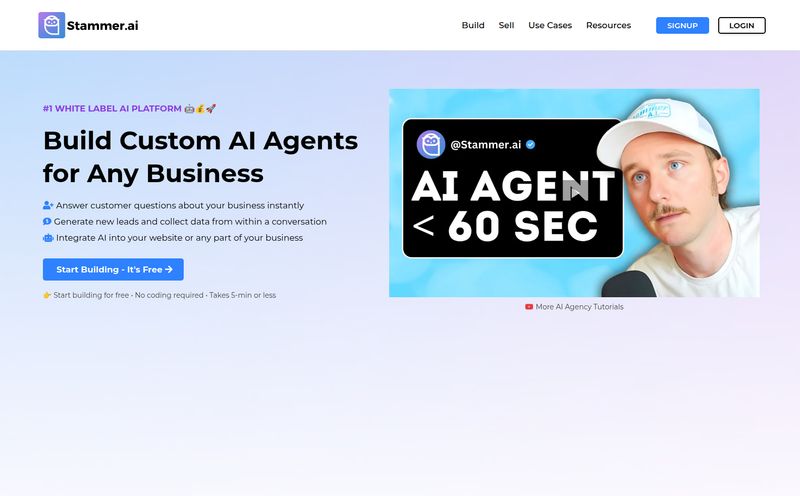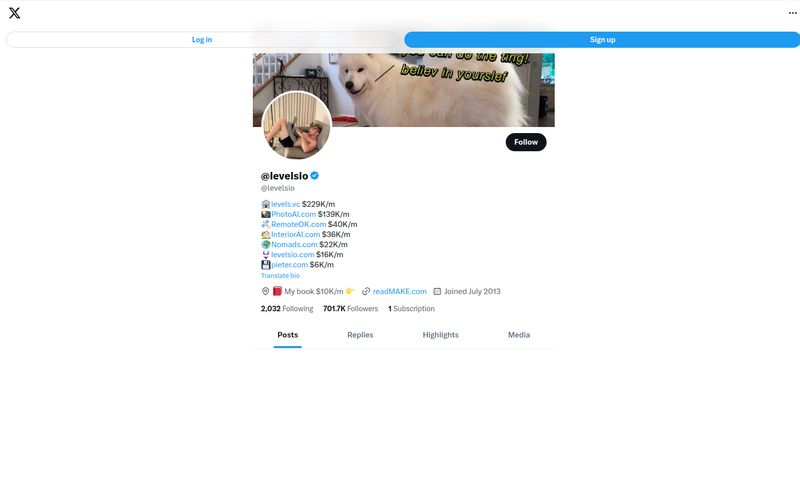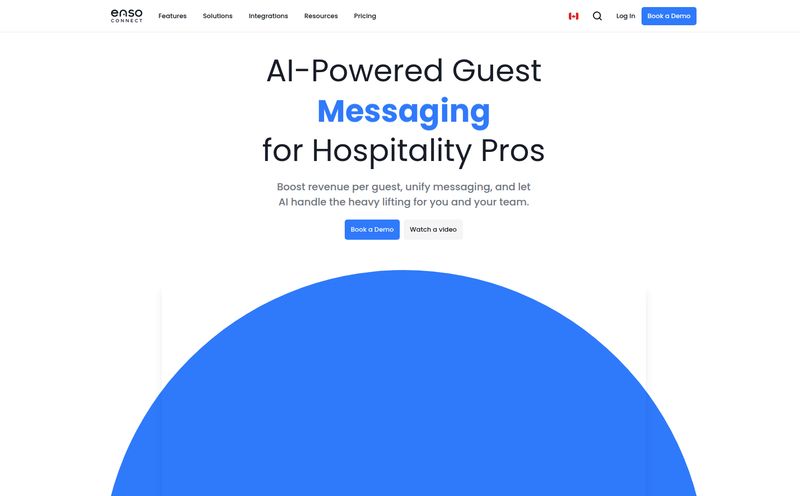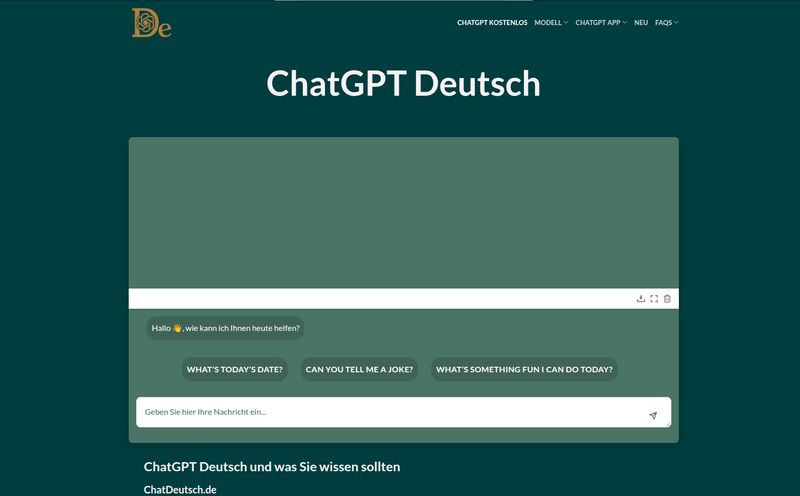In the world of SEO and digital marketing, we're swimming in AI tools. Every week, there’s a new “game-changer” that promises to write all your copy, design your graphics, and probably walk your dog. Most of them are... okay. They’re a helpful starting point, a rough first draft. But when you move into a field like law, where a misplaced comma can cost millions, “okay” doesn’t cut it.
That’s the space Luminance is trying to own. They’re not just another AI; they’re pitching themselves as “Legal-Grade AI.” That phrase alone caught my attention. It’s bold. It implies a level of precision and reliability that most generalist AIs simply can't promise. For years, I've seen legal departments buried under mountains of contracts, due diligence paperwork, and discovery documents. It's a manual, soul-crushing process that seems ripe for a tech overhaul. So, when I see a platform backed by names like Slaughter and May and trusted by giants like Tesco, my professional curiosity gets the better of me. Is this the real deal?
So, What Is Luminance, Exactly?
At its core, Luminance is an AI platform built specifically for lawyers and legal professionals. Think of it less like the creative, sometimes wildly imaginative ChatGPT and more like a hyper-specialized, incredibly knowledgeable paralegal who has read every law book ever written. And never needs a coffee break.
It’s built on a proprietary legal Large Language Model (LLM). This is the secret sauce. Instead of being trained on the entire internet—cat videos, Reddit arguments, and all—it's been trained on a massive, curated dataset of legal documents. The goal is for it to understand legal nuance, terminology, and structure. It’s designed to be a co-pilot, not an autopilot. A crucial distinction. The AI is there to augment the human lawyer, to do the heavy lifting, to flag the risks, but not to make the final call. I’ve always believed the best technology empowers professionals, it doesn't try to replace them, and that seems to be the philosophy here.
The Core Features That Actually Move the Needle
A tool is only as good as what it can actually do. Luminance isn't just one thing; it's a suite of tools aimed at different pain points in the legal workflow. Let's break down the parts that really stand out to me.
AI-Powered Contract Review and Negotiation
This is the big one. Imagine you've got a 100-page M&A agreement that needs to be reviewed against your company's standard terms by end of day. The old way? A team of junior associates, gallons of coffee, and a lot of bleary-eyed cross-referencing. Luminance’s AI can ingest that document in seconds and instantly highlight clauses that deviate from the norm, identify missing provisions, and even flag potential risks based on precedent. It's like having a second set of eyes that has perfect memory and zero fatigue.
The negotiation part is also fascinating. The platform can show you how compliant a third-party contract is with your own internal playbooks, suggesting changes and providing justification. This dramatically speeds up the back-and-forth that can stall deals for weeks.
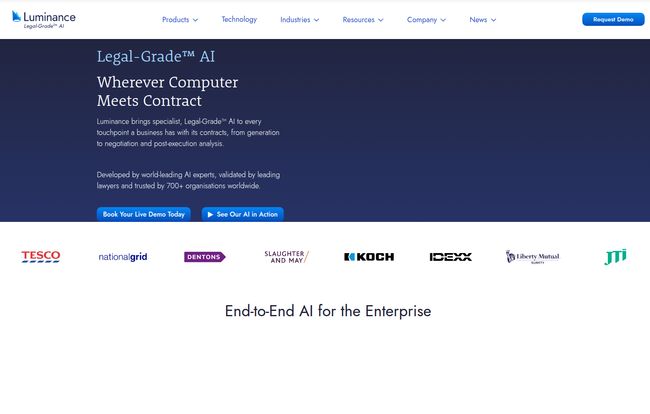
Visit Luminance
A Chatbot That Speaks Legalese
We’ve all gotten frustrated with chatbots, right? Asking a simple question and getting a link to a generic FAQ page. Luminance’s chatbot aims to be different. Because it's tapped into that legal-grade LLM, you can ask it complex questions in natural language like, “Which contracts in our system are governed by New York law and lack a force majeure clause?” and get an instant, accurate answer. It’s a research assistant on steroids, turning a massive, unstructured document repository into a searchable database.
Taking Legal AI Beyond the Legal Department
Here’s something I think is particularly smart. A lot of contract bottlenecks don’t even happen in the legal department. They happen when a salesperson uses an old template or a procurement manager agrees to weird payment terms. Luminance aims to push its intelligence out to the entire business. Through integrations with tools people actually use—like MS Word, Outlook, and Salesforce—it can guide non-legal staff as they create and negotiate contracts. This empowers them to self-serve on low-risk agreements while automatically flagging anything unusual for legal review. It's about building a safety net across the entire organization.
The Good, The Bad, and The AI
No tool is perfect. As someone who has tested and reviewed hundreds of platforms, I’ve learned to celebrate the wins while keeping a very realistic eye on the potential drawbacks. Here’s my take on Luminance.
| What I'm Genuinely Impressed By (The Pros) | Potential Hurdles and Healthy Skepticism (The Cons) |
|---|---|
| Serious Time and Cost Savings: Automating the initial review and analysis frees up expensive legal minds for high-value strategic work. The ROI here seems pretty self-evident. Risk Reduction: Human error is a real thing, especially under pressure. The AI provides a consistent, tireless check for compliance and risk, which is invaluable. Empowerment for All: Giving sales and other teams the tools to handle simple contracts correctly without constant hand-holding from legal is a massive efficiency gain. | The Setup Hurdle: This isn’t a plug-and-play tool you download from an app store. It requires implementation, integration, and some training to get the most out of it. The 'Black Box' Fear: Some lawyers are understandably wary of relying on AI. The effectiveness is entirely dependent on the quality of their LLM. Trust has to be earned, and that requires transparency from Luminance and a willingness to adapt from the legal team. Over-Reliance Risk: The co-pilot can't become the pilot. There's a danger that teams could become too reliant on the tech and lose some of their own critical oversight skills. It’s a tool to aid judgment, not replace it. |
So, How Much Does This Legal Co-Pilot Cost?
This is the million-dollar question, isn't it? And in this case, it might literally be. If you go hunting for a pricing page on the Luminance website, you’ll come up empty. In fact, in my digging, I even stumbled across their 404 page—a gentle reminder that even the most sophisticated tehc companies are run by humans who sometimes mislink a page.
But the lack of public pricing isn't a red flag. It’s standard for enterprise-level SaaS. The cost will almost certainly depend on the size of your organization, the number of users, the specific products you need (e.g., Corporate vs. Discovery), and the volume of documents you'll be processing. The business model is built around a “Book a Live Demo” call to action. They want to understand your needs and provide a custom quote. Expect a significant investment, but one that they argue pays for itself in efficiency and risk mitigation.
Who is Luminance Actually For?
Let's be clear, this probably isn't for the solo practitioner working out of a home office. Based on their client list and the complexity of the platform, Luminance is squarely aimed at a few key groups:
- Large Enterprise In-House Legal Teams: Companies dealing with thousands of contracts across procurement, sales, HR and more. The ability to enforce compliance at scale is the main draw.
- Major Law Firms: Especially those handling M&A, litigation, and large-scale due diligence projects where they need to analyze a virtual data room with tens of thousands of documents quickly and accurately.
- Highly Regulated Industries: Think financial services and pharmaceuticals, where contract compliance isn't just a good idea, it's a legal necessity.
Final Thoughts From the Trenches
After looking at what Luminance offers, I'm cautiously optimistic. The legal industry has been notoriously resistant to technological change, often for good reason. But the pressures of the modern business world—the demand for speed, efficiency, and cost control—are undeniable. A tool like Luminance isn’t just a “nice-to-have” anymore; it's becoming a strategic necessity for staying competitive.
It’s not magic. It requires investment, training, and a shift in mindset. But the idea of transforming lawyers from document reviewers into strategic advisors, powered by an AI co-pilot that handles the grunt work? That’s not just smart marketing. It’s the future of the profession.
Frequently Asked Questions
- 1. What is Luminance AI?
- Luminance is an advanced AI platform designed for the legal profession. It uses a proprietary legal-specific Large Language Model (LLM) to automate the generation, negotiation, and analysis of contracts and other legal documents.
- 2. How is Luminance different from a general AI like ChatGPT?
- The main difference is its training data. While ChatGPT is trained on the broad internet, Luminance's AI is trained specifically on a vast corpus of verified legal documents. This makes it far more accurate and reliable for understanding complex legal concepts, clauses, and terminology.
- 3. What software does Luminance integrate with?
- Luminance offers integrations with common business tools to fit into existing workflows, including Microsoft Word, Outlook, and Salesforce.
- 4. Is Luminance only for lawyers?
- While its core audience is legal professionals, one of its key features is empowering non-legal teams (like sales and procurement) to handle routine contracts safely. It provides them with AI-powered guidance and flags any high-risk issues for the legal team's review.
- 5. Can Luminance handle eDiscovery?
- Yes, Luminance has a dedicated product for end-to-end eDiscovery. It helps legal teams sift through massive datasets during litigation or investigations to find the crucial information quickly, significantly reducing the time and cost associated with the discovery process.
Wrapping It Up
So, is Luminance the future? It certainly looks like a very big part of it. For any large organization or law firm feeling the squeeze of overwhelming paperwork and the pressure to do more with less, ignoring this kind of technology is no longer an option. It's a powerful co-pilot, and in the turbulent skies of corporate law, having a good one can make all the difference.
